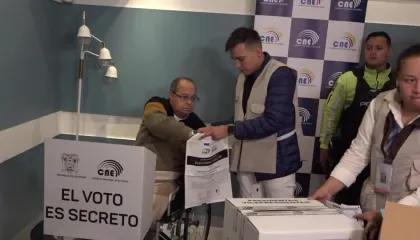The presidential election in Ecuador is heading to a second round, scheduled for April 13, amid a highly competitive scenario between current President Daniel Noboa and opposition candidate Luisa Gonzalez. With nearly 80% of the votes counted by early Monday morning (10), the difference between the two candidates was minimal: Noboa led with 44.5% of the votes, while Gonzalez was close behind with 44.1%. The tight race indicates that Ecuadorian voters will have to return to the polls to decide who will govern the country for the next four years.
The president of the National Electoral Council (CNE), Diana Atamaint, highlighted in a press conference on Sunday (9) that, based on the trend observed in the counting, holding a second round has become nearly inevitable. “If the trend continues, Ecuadorians will return to the polls on April 13,” she stated.
This year’s election marks yet another clash between Noboa and Gonzalez, who had already faced each other in the 2023 elections. At that time, the contest took place in an unusual context, as both were running to complete the term of former President Guillermo Lasso, who left office before the end of his presidency. Noboa won that election and assumed the presidency of Ecuador amid a severe economic crisis and an unprecedented urban violence situation. Now, he seeks re-election to consolidate his administration and advance his security and economic development proposals.

Since assuming the presidency, 37-year-old Daniel Noboa has heavily invested in public security measures to curb the rising violence in Ecuador. In recent years, the country has become one of the epicenters of drug trafficking in South America, with an alarming increase in homicides, attacks on authorities, and riots in prisons. To tackle this issue, Noboa ordered the mobilization of military troops to patrol the streets and penitentiaries, in addition to intensifying operations against criminal groups. According to him, these measures resulted in a 15% reduction in violent deaths and the arrest of key leaders of criminal factions.
However, his main opponent, 47-year-old Luisa Gonzalez, argues that the government’s actions are insufficient to restore security in the country. Protected by former President Rafael Correa, Gonzalez advocates for an even tougher approach to fighting crime, promising to intensify military and police operations in areas controlled by factions, as well as pursue judges and prosecutors suspected of corruption. She also proposes a social spending plan targeting communities most affected by violence, arguing that combating crime needs to be accompanied by investments in education, employment, and infrastructure.
In an impassioned speech to her supporters in Quito, Gonzalez declared, “This victory is for you, because Daniel Noboa represents fear, and we represent hope, change, the hope of transforming the country.” She also emphasized that her candidacy continues to grow as votes are counted. “We are almost in a technical tie, with a clear trend: we continue to rise, while Noboa is falling.”
The final stages of the election count have been marked by tension and accusations of fraud from the opposition. Gonzalez and her political mentor, Rafael Correa, have denounced possible irregularities in the electoral process and claimed that Noboa’s government attempted to manipulate the results. The candidate even accused the president of the CNE, Diana Atamaint, of favoring Noboa by allowing him to disregard campaign rules.
On the side of the current president, the campaign also faces challenges. Noboa is involved in a standoff with his vice president, Verónica Abad, over the possibility of taking a leave of absence to focus on the second-round campaign. The Constitutional Court of Ecuador recently invalidated two decrees that would have allowed this leave, complicating his electoral strategy and preventing him from appointing an interim vice president to temporarily replace him.
Furthermore, in recent weeks, the government has announced a series of measures seen as attempts to garner votes, such as incentives for Ecuadorians returning from the United States, tariffs on Mexican imports, and the signing of a trade agreement with Canada. These actions have been criticized by opponents as opportunistic and short-sighted.
The closeness between the two candidates indicates that the campaign for the second round will be highly polarized. Gonzalez has the support of the political base of former President Correa and bets on a discourse of strengthening the state, social investments, and combating corruption in the judiciary. Meanwhile, Noboa seeks to solidify his image as a determined leader in confronting the security crisis and stimulating the economy.
The electoral scenario may still undergo significant changes in the coming weeks. The second round will be decisive in determining the future of Ecuador during a critical moment in its history. The country faces not only internal challenges of security and the economy but also external pressures, such as the migration crisis and the impact of drug trafficking in the region.
With results still being counted and the margin between the two candidates narrowing, the outcome of this race remains undecided. By April, both Noboa and Gonzalez will need to mobilize undecided voters and reinforce their proposals while Ecuador prepares for yet another pivotal chapter in its political trajectory.
The presidential election in Ecuador is shaping up to be one of the most contested in the country’s recent history. The polarization between a government focused on strengthening security and an opposition advocating for broad social reforms makes the second round a crucial moment for Ecuadorians.
Regardless of the result, the next president will face the challenge of uniting a divided country and implementing effective solutions for the deep crises affecting society. The unfolding of the campaign in the coming weeks will be decisive in shaping the political and economic future of Ecuador.

